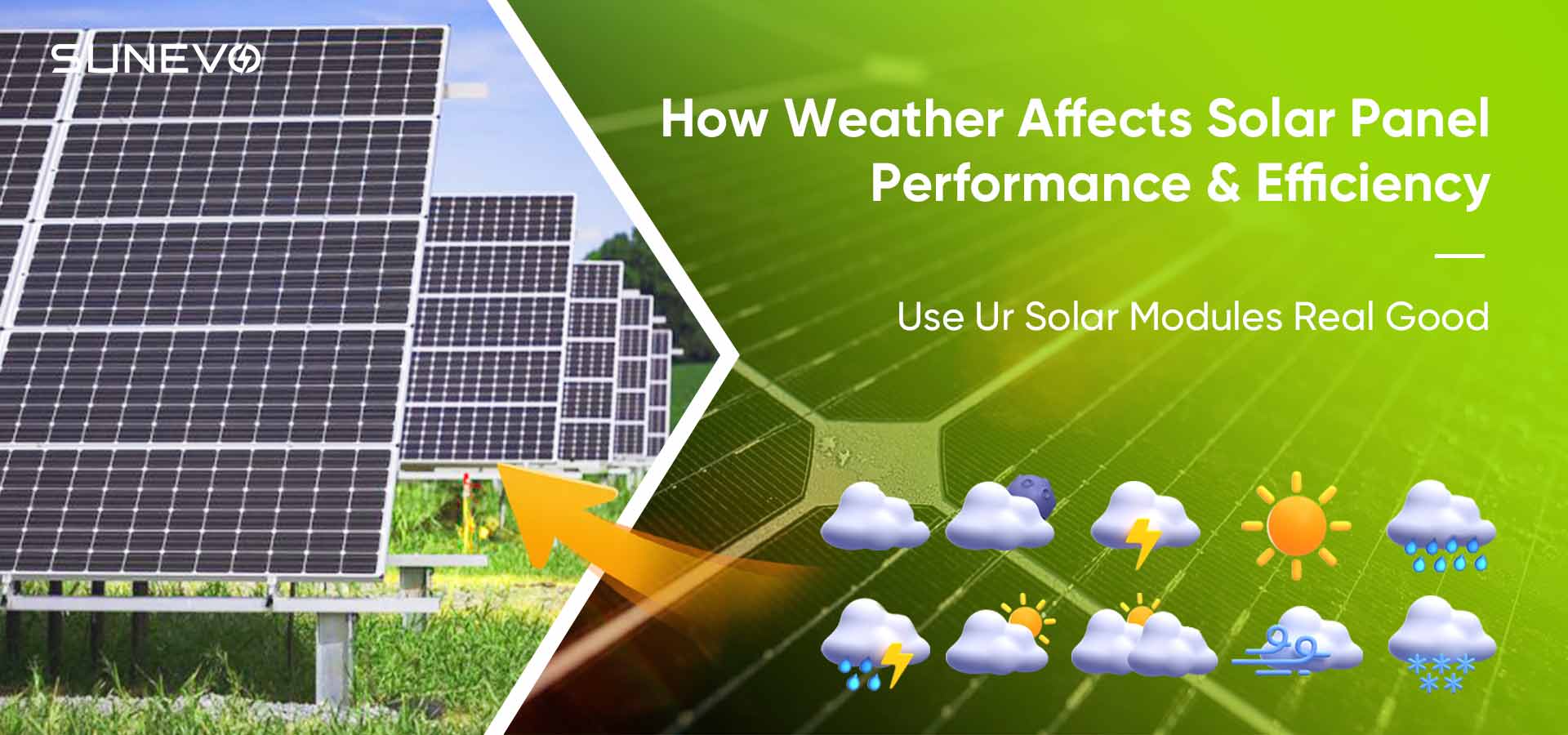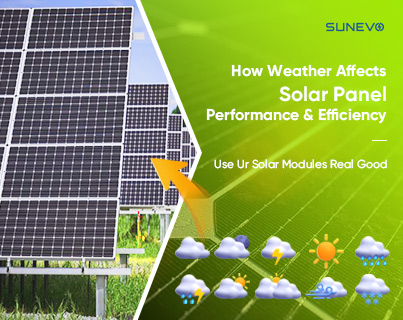

Harnessing the power of the sun is an integral part of our journey towards renewable energy. Solar panels play a vital role in this process by converting sunlight into electricity. However, their efficiency, or the amount of sunlight they can convert into usable energy, is influenced by a variety of factors.
Solar panel efficiency is a topic that doesn't just interest scientists and engineers; it’s something that every consumer of solar power should understand. In this post, we delve into the world of solar panel efficiency and the factors that influence it, focusing on how weather conditions can affect the performance of solar panels. This is a critical aspect of maximizing their contribution to our energy needs and ensuring we make the most out of this renewable energy source.
Understanding Solar Panel Efficiency:
The term 'solar panel efficiency' refers to the amount of sunlight that the panel can convert into electricity. This is directly linked to the advancements in solar modules manufacturing, which have enabled the creation of panels that can convert a greater proportion of sunlight into energy.
High-efficiency solar panels are the holy grail in the world of solar power. Not only do they produce more energy, but they also reduce the overall cost per unit of energy produced, making solar power a more affordable option for many. Therefore, understanding solar panel efficiency, how it’s measured, and how it can be improved is crucial to maximizing energy production and lowering energy costs.
The Impact of Sunlight Intensity:
One key factor that influences solar panel performance is the intensity of sunlight the panel receives. It's quite straightforward - the more intense the sunlight, the greater the energy production. However, weather conditions such as cloud cover, fog, and haze can affect this intensity, thereby influencing the efficiency of the panel.
On a cloudy day, a solar panel may produce only 10-25% of its maximum output. This is because the clouds block a significant amount of sunlight from reaching the panels. However, even in such weather, solar panels can still produce electricity due to the diffuse sunlight that penetrates the clouds, thus ensuring a constant, if reduced, energy production.
The Role of Temperature:
Contrary to what one might intuitively assume, solar panels don't always perform better in hotter conditions. In fact, the efficiency of solar panels decreases as the temperature rises. This is due to something called the temperature coefficient, which measures the decrease in output for every degree increase in the panel's temperature above 25°C (77°F).
This means that while sunny weather is beneficial for solar energy production, extremely hot temperatures can negatively impact panel efficiency. This is an important factor to consider, especially in regions with high average temperatures.
The Effect of Rain and Snow:
Precipitation, in the form of rain or snow, can also have an impact on solar panel efficiency. Rain and snow can block sunlight from reaching the panels, thereby decreasing their output. However, rain isn't always bad for solar panels. In some cases, a light rain can help clean the panels and potentially increase their efficiency by removing dust and other debris that might have accumulated on the surface.
On the other hand, heavy snowfall can completely cover panels, reducing their sunlight exposure to zero and requiring manual removal to restore function. This highlights the need for efficient snow removal systems in areas with heavy snowfall.
Dealing with Cloudy Days:
Cloudy weather poses significant challenges for solar panels. However, thanks to the presence of diffuse sunlight - the sunlight that reaches the ground after being scattered by atmospheric particles - solar panels can still produce electricity even on cloudy days. While the output of solar panels is reduced on cloudy days, the drop in production is not as significant as one might expect, demonstrating the resilience and reliability of solar power systems.
Optimizing Performance in Hot Climates:
Hot climates can pose challenges for solar panels, including heat-induced efficiency loss and potential damage due to high temperatures. However, through proper installation, ventilation, and cooling techniques, these negative impacts can be mitigated.
For example, panels can be installed with a gap between them and the roof to allow air circulation, which helps to cool them down and maintain efficiency. Additionally, using cooling systems and heat-resistant materials can help protect the panels and extend their lifespan, ensuring they remain a viable source of energy for a longer period.
Enhancing Efficiency in Cold Climates:
Cold climates present their own unique set of challenges for solar panels, including reduced sunlight hours and heavy snowfall. However, innovative measures like snow removal, tilt adjustments, and anti-reflective coatings can help optimize performance.
Interestingly, solar panels can perform more efficiently in cold, sunny conditions due to the positive effect of low temperatures on panel efficiency. This makes solar panels a feasible energy solution even in colder regions, as long as there is adequate sunlight.
The Importance of Maintenance and Cleaning:
The efficiency of solar panels isn't just influenced by weather conditions - regular maintenance and cleaning are also key to ensuring optimal solar panel performance. Dust, dirt, and other debris can accumulate on the panels and reduce the amount of sunlight they can absorb, affecting their efficiency.
Regular cleaning, especially after a storm or heavy winds, can help maintain the efficiency of the panels. Moreover, annual inspections can help detect and fix any potential issues before they significantly affect performance. These maintenance tasks, while seemingly minor, can significantly contribute to the overall efficiency and longevity of a solar power system.
Last But Not Least:
In conclusion, the efficiency of solar panels is influenced by several weather-related factors, including sunlight intensity, temperature, and precipitation. By understanding these influences, we can take appropriate measures, such as optimal installation, regular maintenance, and timely cleaning, to maximize solar panel efficiency and overall energy production, and if you want to boost your solar efficiency, you can click here!
As we continue to rely more on renewable energy sources, every bit of efficiency gained from our solar panels counts towards a more sustainable future. By considering weather factors when installing and maintaining solar panels, we can ensure we're getting the most out of our investment and contributing to a greener, more sustainable world.